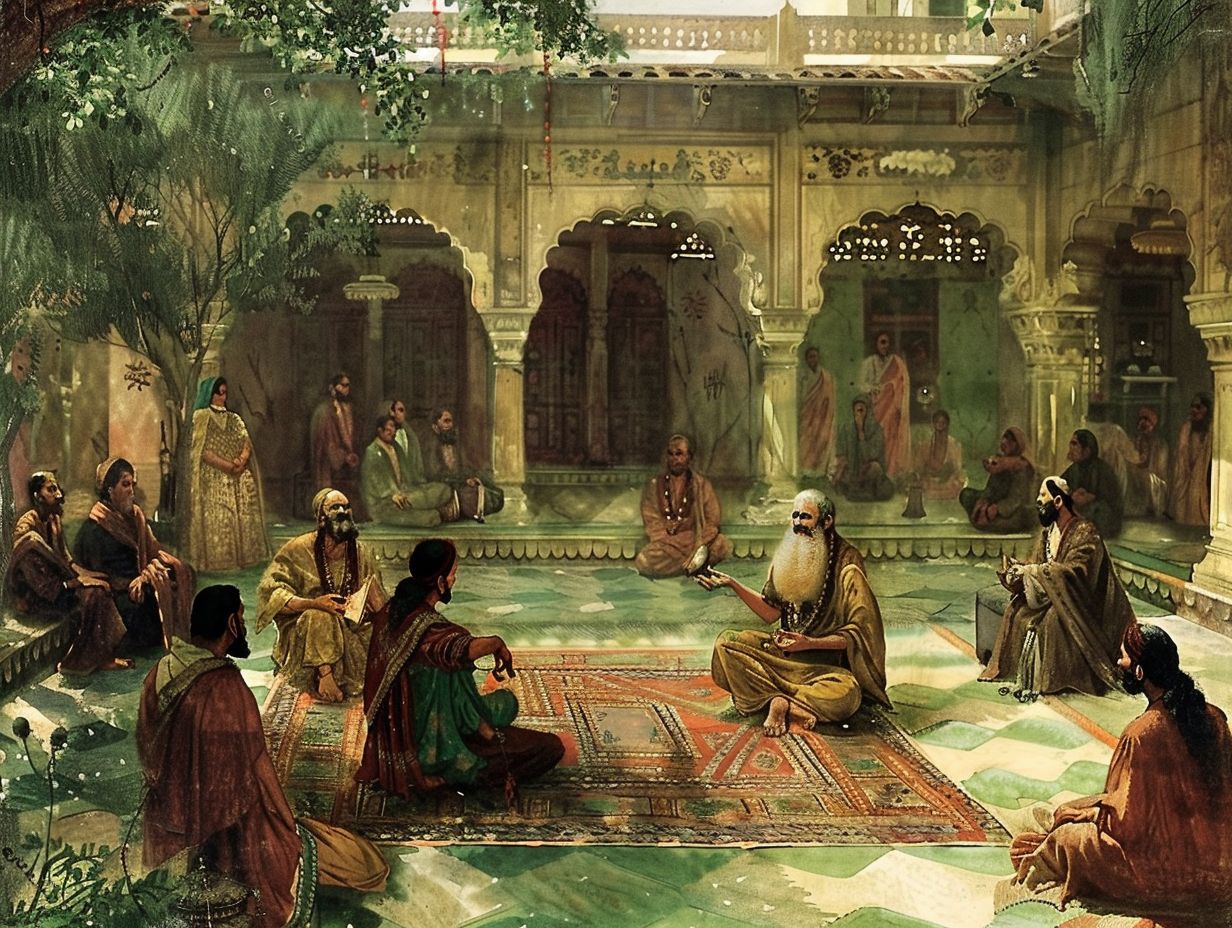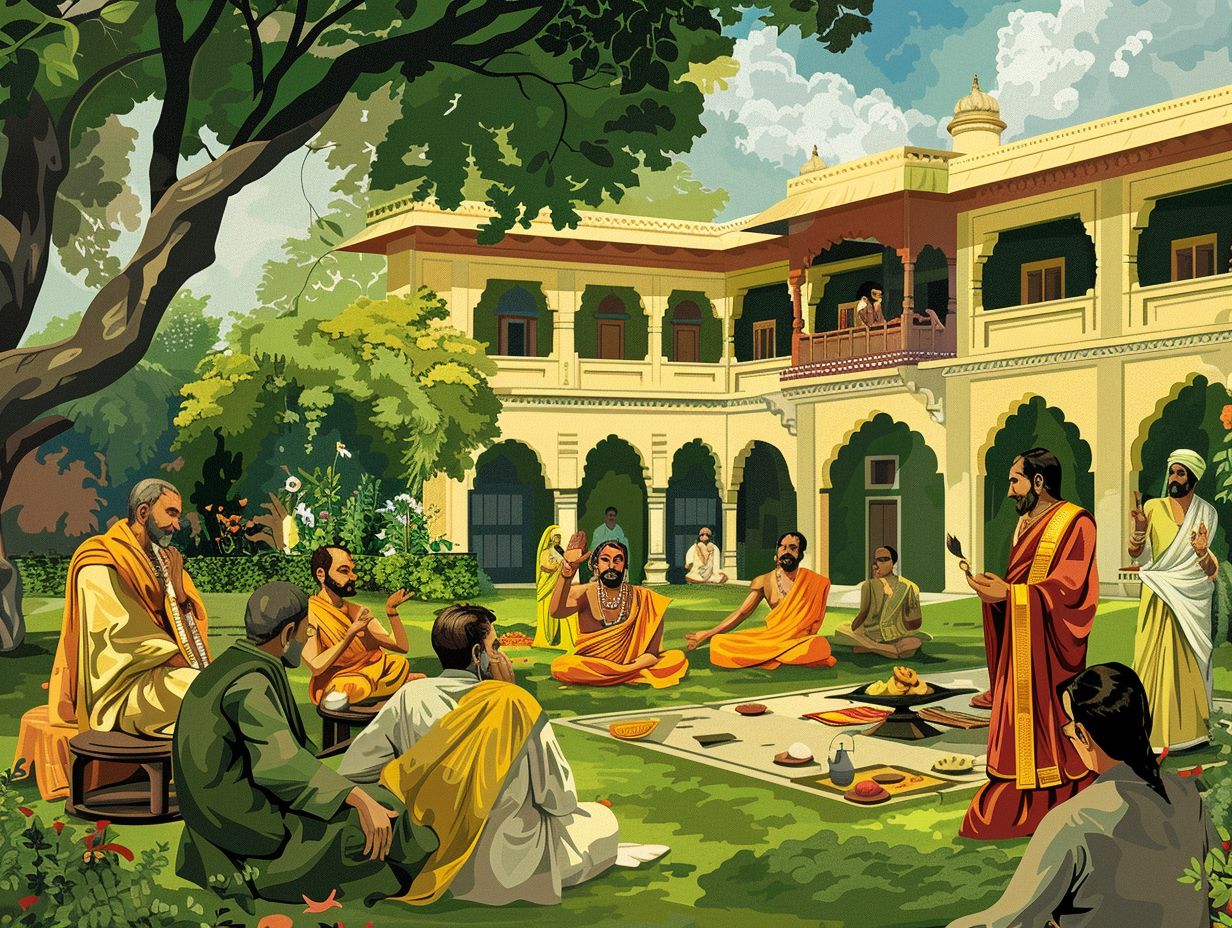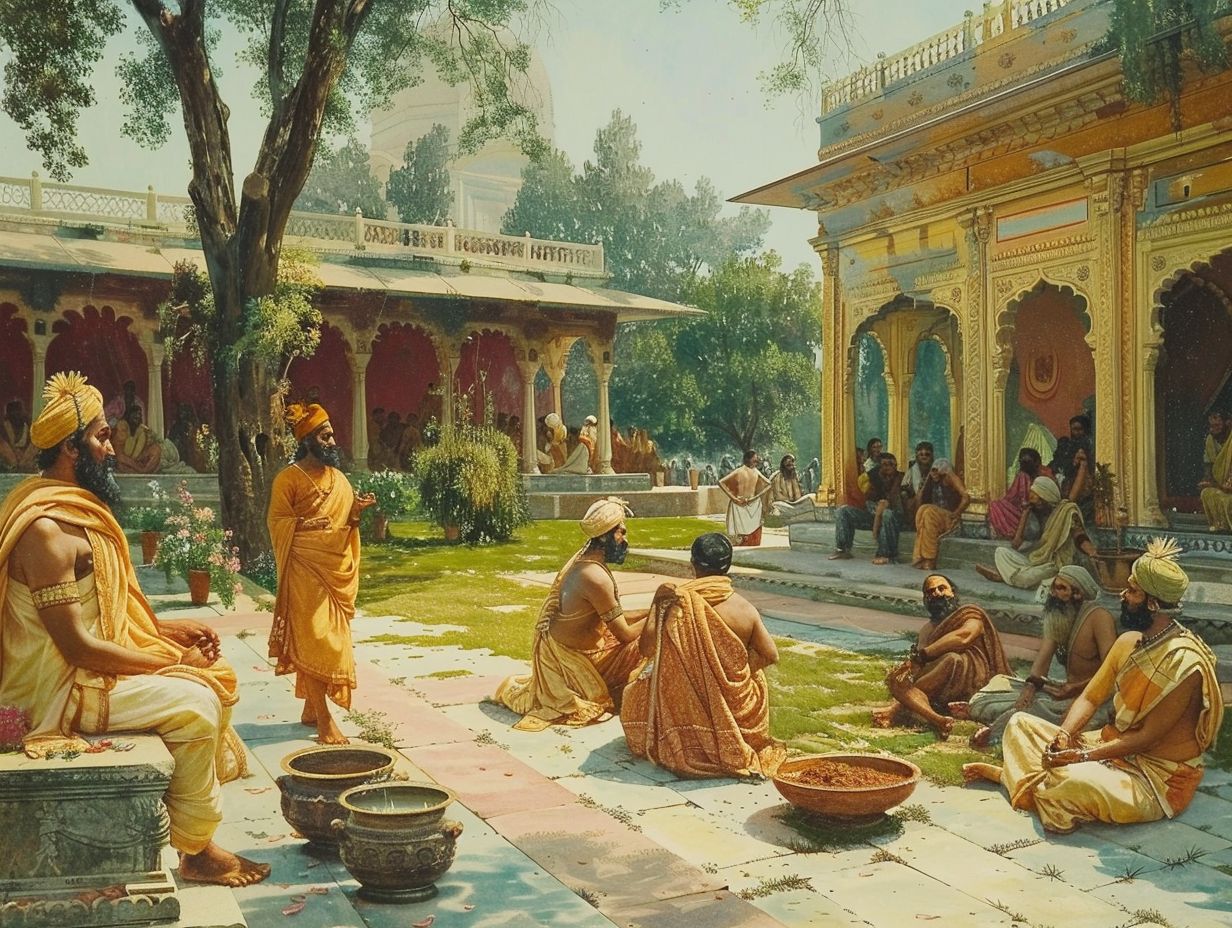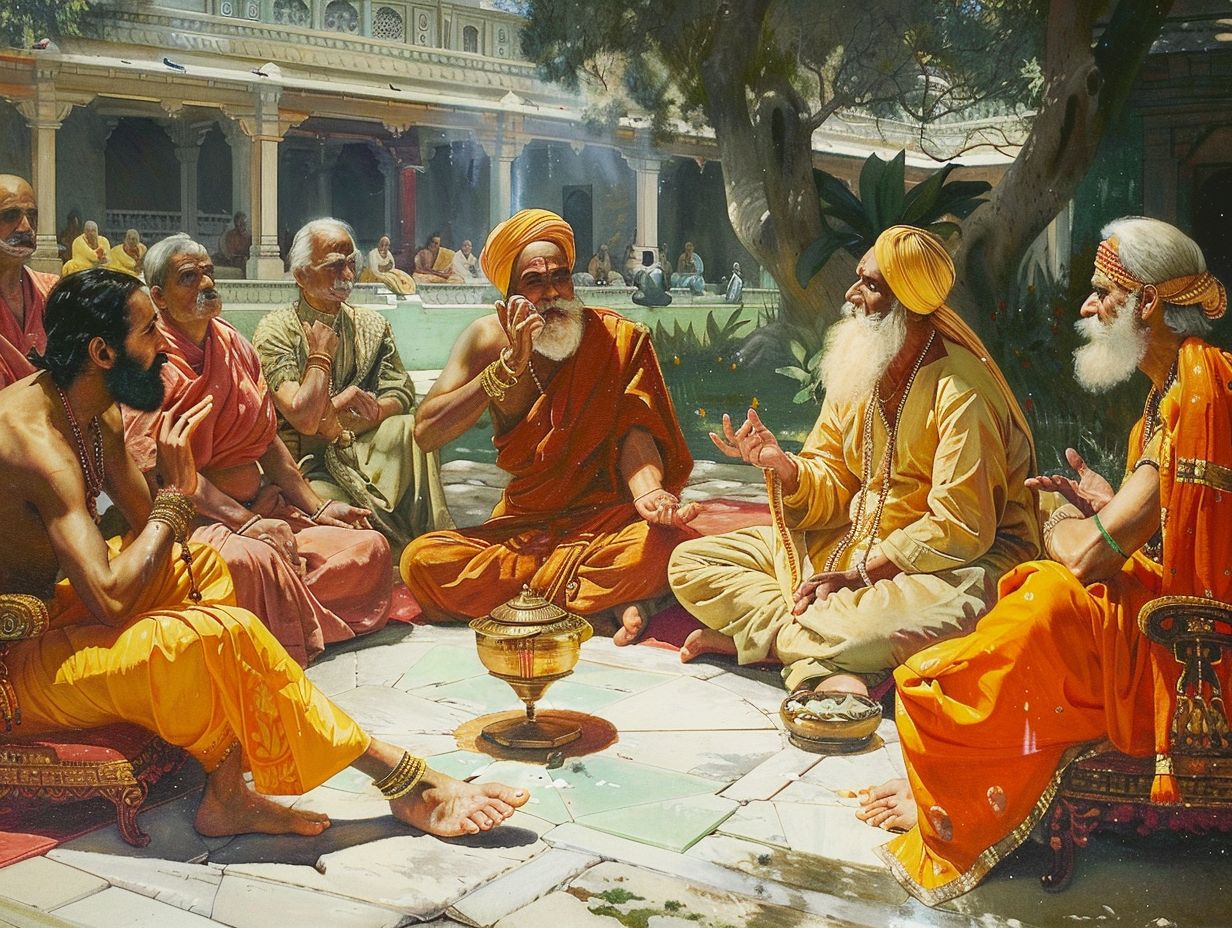Rejection of Yoga by Charvakas
The Charvakas, an ancient Indian philosophical school, are distinguished by their materialistic worldview and a pronounced skepticism toward spiritual practices such as yoga.
Firmly rooted in empirical evidence and a commitment to tangible experiences, they assert numerous objections to yoga, citing its lack of scientific foundation and its potential for manipulation.
This examination delves into the Charvakas’ belief system, articulating their arguments against yoga while exploring their perceptions of its practice. Ultimately, it considers the benefits and drawbacks of their stance on yoga.
This discussion invites readers to engage with these intriguing perspectives.
Who are the Charvakas?

The Charvakas, also referred to as the Lokayata, emerged as a noteworthy philosophical school in ancient India, presenting a materialistic worldview that sharply contrasted with the dominant spiritual systems of their era.
Their atheistic position, which dismisses the authority of Vedic texts, asserts that sensory perception is the sole source of knowledge, championing a rational inquiry into the nature of reality and existence. By advocating a philosophy grounded in empirical evidence and fostering skepticism towards metaphysical claims, the Charvakas underscored the significance of human experience in the pursuit of understanding consciousness and the self.
In doing so, they made a vital contribution to the philosophical discourse of ancient India.
What is the Belief System of Charvakas?
The Charvakas’ belief system is fundamentally rooted in a materialistic viewpoint that prioritizes empirical evidence and sensory perception as the exclusive pathways to knowledge, thereby dismissing metaphysical speculation and spiritual doctrines.
Renowned for their incisive critique of asceticism and the Vedic tradition, the Charvakas contend that true happiness and liberation can be attained through direct engagement with the material world, rather than through the denial or renunciation of physical pleasures.
This atheistic philosophy advocates for a pragmatic approach to life, asserting that ethical considerations should emerge from human experience rather than divine edicts.
Why Do Charvakas Reject Yoga?
The Charvakas’ dismissal of yoga arises from their fundamental skepticism toward practices that place metaphysical beliefs and asceticism above empirical evidence and sensory experiences. They assert that yoga, commonly linked with spiritual liberation and enlightenment, is founded on unverified concepts that lack grounding in reality, thus conflicting with their materialistic perspective.
The Charvakas maintain that these practices fail to foster authentic happiness or self-realization; instead, they cultivate an illusion of dualism, diverting individuals from fully appreciating the tangible pleasures that life has to offer.
1. Lack of Evidence
One of the primary reasons the Charvakas reject yoga lies in the absence of empirical evidence supporting its effectiveness in achieving spiritual liberation or enlightenment. This skepticism is deeply embedded in their broader philosophical framework, which elevates direct experience and observable phenomena to the status of the only legitimate sources of knowledge.
For the Charvakas, concepts of consciousness and spiritual states that exceed the physical realm are not merely unsubstantiated by scientific inquiry; they are also viewed as detrimental, diverting attention from the tangible reality of existence. They advocate for a pragmatic approach to life, encouraging individuals to pursue evidence-based practices that deliver observable benefits. This further solidifies their critique of mystical practices such as yoga.
Thus, the Charvakas’ insistence on empirical evidence serves to challenge the validity of any technique that claims to unlock higher states of being without substantial proof.
2. Focus on Materialism
The Charvakas advocate a philosophy of materialism that prioritizes sensory experiences and the pursuit of pleasure, positioning these elements above the physical and mental disciplines often associated with yoga. They assert that self-indulgence should be celebrated as an essential component of the human experience, leaving scant room for the ascetic and frequently restrictive practices that yoga entails.
This group views yoga as an unwarranted constraint, contending that it detracts from the joy found in life s immediate pleasures, including food, drink, and companionship. By dismissing the idea of spiritual elevation gained through meditation and physical postures, they champion a lifestyle that embraces the present moment.
Their beliefs are firmly anchored in the notion that true happiness is achieved through tangible experiences and the fulfillment of desires, rather than through mental discipline or spiritual endeavors.
3. Disregard for the Divine
The Charvakas’ atheistic perspective engenders a profound disregard for the divine elements typically associated with yoga and its spiritual practices.
This philosophical critique delineates a stark contrast between their materialistic ethos and the traditional interpretations of yoga, which champion spiritual enlightenment and a connection to a higher power. By dismissing the metaphysical dimensions of existence, they champion a practice grounded in the tangible and the experiential, placing a premium on physicality and personal autonomy over esoteric beliefs.
As a result, their approach to yoga evolves into a pragmatic exercise, emphasizing bodily health and well-being instead of serving as a pathway to spiritual wisdom. This distinctive stance underscores their dedication to a secular philosophy, framing yoga as a discipline that operates independently of religious dogma, thereby rendering it accessible to all, irrespective of personal beliefs.
What are the Main Arguments Against Yoga by Charvakas?

The Charvakas offer a compelling critique of yoga, presenting a series of arguments that challenge the foundational concepts of spiritual practices through a lens of skepticism. Their philosophical stance invites a reevaluation of widely accepted beliefs, engaging in a thoughtful discourse that questions the very essence of these practices.
1. Yoga is Based on Unproven Concepts
The Charvakas contend that yoga is fundamentally grounded in concepts that remain unproven and devoid of empirical evidence, rendering it a questionable practice from their rationalist viewpoint.
Their skepticism emerges from a broader philosophical framework that advocates for sensory experience and tangible proof as the only legitimate sources of knowledge. This critical perspective prompts essential inquiries into the validity of practices that do not withstand rigorous scientific examination.
By rejecting the metaphysical assertions often linked to yoga, the Charvakas challenge practitioners to revisit the foundational beliefs underpinning these disciplines. They emphasize the necessity of empirical evidence in assessing benefits, advocating for a more rational approach that encourages individuals to pursue established facts rather than relying on subjective experiences that may offer little more than anecdotal support.
2. Yoga is a Means of Control and Manipulation
The Charvakas argue that yoga can be viewed as a mechanism for control and manipulation, fostering a misleading sense of spirituality that diverts individuals from authentic human experiences.
This viewpoint highlights a broader philosophical critique regarding the appropriation of yoga across various spiritual traditions, where it often becomes enmeshed with elements that prioritize control over genuine self-exploration. Proponents of the Charvakas contend that such practices can unwittingly divert individuals from confronting their true nature and vital lived experiences. Rather than serving as a pathway to enlightenment, the ritualistic components of yoga may reinforce existing power structures, offering only a superficial engagement with profound existential questions.
Consequently, the Charvakas invite practitioners to engage in critical reflection about the motivations underpinning their practices, urging them to pursue more authentic connections with their own consciousness and the world that surrounds them.
3. Yoga Promotes Passivity and Inaction
The Charvakas contend that yoga fosters an undesirable state of passivity and inaction, standing in stark contrast to their belief in the necessity of active engagement with the material world. This philosophical viewpoint emphasizes their dedication to materialism, asserting that a meaningful life is best achieved through direct participation in one s environment, rather than through introspective practices that may promote detachment.
For the Charvakas, ethical living does not hinge upon asceticism or renunciation; instead, it is rooted in the tangible experiences and relationships that define human existence. By wholeheartedly embracing the physical and sensual pleasures life has to offer, they argue that individuals can develop a more authentic ethical framework, which stands in sharp opposition to the tranquility and stillness often associated with yoga.
This perspective illuminates a significant tension between the serene, frequently passive nature of yoga and the vigorous principles advocated by the Charvakas, suggesting that those who adhere to yoga might overlook the rich tapestry of life s myriad experiences.
How Do Charvakas View the Practice of Yoga?
The Charvakas approach the practice of yoga with a pragmatic perspective, often perceiving it primarily as a form of physical exercise rather than a spiritual discipline intended for enlightenment or liberation.
1. As a Form of Entertainment
The Charvakas may perceive yoga primarily as a form of entertainment, offering enjoyment and physical engagement devoid of the spiritual implications often emphasized in traditional practices.
In this context, yoga evolves into an endeavor that highlights the pleasure of movement and the excitement of discovering one’s physical potential. For many who resonate with materialistic beliefs, engaging in yoga is viewed as an opportunity to enjoy the benefits of exercise and social interaction without venturing into philosophical or mystical realms. The emphasis shifts to the gratification found in mastering postures and enhancing flexibility, fostering a sense of community among practitioners who relish each other’s company.
Ultimately, this perspective embodies a more grounded approach, where physicality and personal enjoyment take precedence over spiritual aspirations.
2. As a Means of Physical Exercise

For the Charvakas, yoga is regarded chiefly as a method of physical exercise, one that yields numerous health benefits while fostering a robust connection between body and mind.
From the perspective of Charvaka philosophy, this ancient practice emphasizes the significance of tangible physical outcomes over abstract spiritual endeavors. Through the practice of yoga, individuals can attain enhanced flexibility, increased strength, and overall improvements in fitness. The deliberate movements combined with controlled breathing create a harmonious union of body and mind, cultivating awareness that alleviates stress and sharpens mental clarity.
In this manner, yoga emerges as a holistic pursuit, not only fortifying the muscles but also nurturing emotional well-being, thus proving to be an invaluable addition to one s lifestyle.
3. As a Way to Achieve Personal Goals
The Charvakas regard the practice of yoga as a pragmatic tool for achieving personal goals and fostering self-improvement, rather than viewing it as a spiritual endeavor aimed at enlightenment.
In this light, yoga emerges as an effective method for individuals seeking to enhance their physical and mental well-being, aligning seamlessly with their aspirations for personal growth. By concentrating on mindfulness, flexibility, and strength, practitioners are able to cultivate resilience and gain a clearer understanding of their ambitions. This perspective highlights the tangible benefits of yoga such as improved focus and emotional regulation which can be essential for those striving to establish and attain meaningful objectives.
For the Charvakas, the emphasis lies not on seeking transcendental experiences but on harnessing the capabilities of the body and mind through yoga to forge a more fulfilling and productive life.
What are the Potential Benefits and Drawbacks of Rejecting Yoga?
For the Charvakas, who place a high value on materialism and empirical evidence in their quest for happiness and fulfillment, the rejection of yoga as a practice presents a complex landscape of both advantages and disadvantages.
1. Benefits of Rejecting Yoga
One significant advantage of the Charvakas’ rejection of yoga lies in their liberation from the spiritual obligations and ascetic practices often associated with such disciplines. This choice allows them to concentrate on material happiness.
By adopting a more grounded approach to life, they place a premium on sensory experiences rather than transcendental pursuits, which they perceive as distractions from authentic joy. The Charvakas maintain a steadfast belief that true happiness is derived from tangible pleasures found in the present moment, rather than through the physical postures or meditative states emphasized by yoga.
This rejection not only reinforces their hedonistic perspective but also aligns seamlessly with their materialistic philosophy, wherein the body and mind are viewed as interconnected avenues to everyday enjoyment. Thus, individuals are encouraged to fully engage with the world around them.
In this context, the pursuit of happiness transforms into an inclusive journey of self-gratification, celebrating the immediate offerings of life.
2. Drawbacks of Rejecting Yoga
Despite the numerous advantages, the Charvakas dismissal of yoga presents notable drawbacks, particularly in relation to the potential health benefits and avenues for self-realization that yoga can offer.
By distancing themselves from practices that encourage mindfulness and physical well-being, they risk overlooking a comprehensive approach to health that integrates both body and mind. The neglect of physical wellness can lead to a range of ailments, ultimately undermining their capacity to sustain vitality and energy in their daily lives.
Furthermore, the personal growth opportunities inherent in yoga such as enhanced focus, emotional resilience, and effective stress management could significantly elevate their overall quality of life. Embracing yoga not only has the potential to foster physical strength but also to cultivate a deeper understanding of oneself, thereby enriching their philosophical inquiries.
Frequently Asked Questions
What is the belief of Charvakas regarding yoga?

The Charvakas reject the practice of yoga, as they do not believe in any form of spiritual or religious practices. They believe in living life to the fullest and enjoying sensual pleasures, rather than seeking enlightenment through yoga.
Why do Charvakas reject the concept of yoga?
Charvakas view yoga as a means of escaping reality and indulging in false hopes and beliefs. They value rationality and logic, and do not see the need for spiritual practices like yoga.
Do Charvakas have any alternative for achieving inner peace and happiness?
Yes, Charvakas believe that one can find happiness and inner peace through indulging in sensual pleasures and living in the present moment, rather than through spiritual practices like yoga.
What is the main difference between the concept of yoga and Charvaka philosophy?
The main difference lies in their beliefs about the ultimate goal of life. Yoga aims for spiritual enlightenment and liberation, while Charvakas prioritize living life to the fullest and finding happiness in the present moment.
Is there any conflict between the rejection of yoga by Charvakas and other religious practices?
Yes, the rejection of yoga by Charvakas can be seen as conflicting with other religious practices that promote the search for ultimate truth and spiritual enlightenment. However, Charvakas do not see this as a problem as they do not believe in any form of afterlife or higher power.
What is the modern-day relevance of Charvaka philosophy and their rejection of yoga?
Charvaka philosophy still holds relevance in today’s society, as their emphasis on living in the present and valuing rationality and logic can be seen as a counterbalance to the spiritual practices and beliefs that are prevalent in many cultures. The rejection of yoga by Charvakas also highlights the diversity of beliefs and perspectives within the field of spirituality and personal growth.
